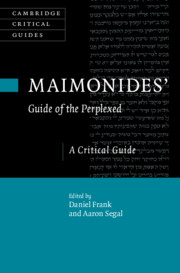Book contents
- Maimonides’ Guide of the Perplexed
- Cambridge Critical Guides
- Maimonides’ Guide of the Perplexed
- Copyright page
- Contents
- Contributors
- Introduction
- Part I Form
- Part II Human Beginnings
- Part III The Creator
- Part IV The Created
- Part V Human Finitude
- Part VI Human Ends
- Chapter 13 The Nature and Purpose of Divine Law
- Chapter 14 Maimonides on Human Perfection and the Love of God
- Bibliography
- Index
- Cambridge Critical Guides
Chapter 13 - The Nature and Purpose of Divine Law
from Part VI - Human Ends
Published online by Cambridge University Press: 18 June 2021
- Maimonides’ Guide of the Perplexed
- Cambridge Critical Guides
- Maimonides’ Guide of the Perplexed
- Copyright page
- Contents
- Contributors
- Introduction
- Part I Form
- Part II Human Beginnings
- Part III The Creator
- Part IV The Created
- Part V Human Finitude
- Part VI Human Ends
- Chapter 13 The Nature and Purpose of Divine Law
- Chapter 14 Maimonides on Human Perfection and the Love of God
- Bibliography
- Index
- Cambridge Critical Guides
Summary
This approach to Divine Law that Maimonides diagnoses as rooted in sickness of the soul has its source in a deep religious impulse and sensibility. Such an outlook assumes that providing humanly useful reasons for the commandments empties them of their religious meaning. Divine Law, if it has its source in a God who transcends humanity, must be inscrutable. Even more so, the religious meaning of fulfilling God’s commandments ought to be manifested in the surrender of the human will to the divine will. Worship is constituted as obedience, and such an obedience in principle cannot be in the service of human aims. It is not only the case that humans are incapable of approaching God’s mind and understanding His commands, but rather, the ascription of reasons to God’s commandments runs against their very purpose. The only reason for obeying a commandment is that God commanded it, and any attempt to harness such commandments to foster human aims would taint and undermine their purity as religiously motivated acts. This view is considered by Maimonides as that of sick souls since it constitutes an arbitrary God who commands with no reason, and it posits a human worshiper engaged in meaningless obedience. Maimonides provides a radical and thoroughly anthropocentric alternative to the meaning and end of Divine Law. Divine Law has a reason, it aims at human flourishing and it guides humans to achieve their ultimate perfection.
- Type
- Chapter
- Information
- Maimonides' Guide of the PerplexedA Critical Guide, pp. 247 - 265Publisher: Cambridge University PressPrint publication year: 2021
- 1
- Cited by



